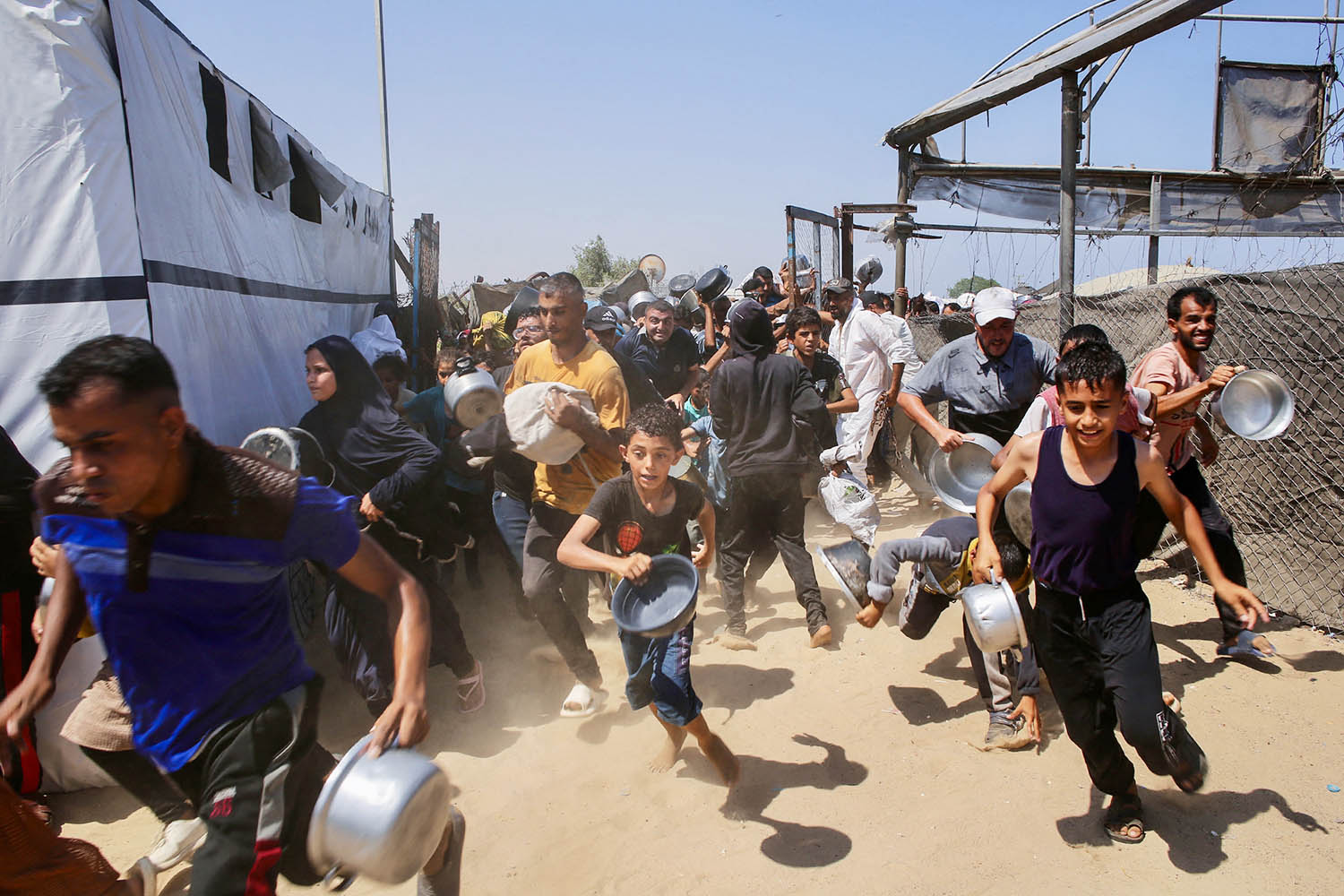For Hassan, surviving famine in Gaza is about the calculations he faces daily – starting with how to precisely split a single piece of bread so that each quarter is a meal.
He walks three miles every day to look for vegetables, and spends hours getting firewood to cook what little food he can find.
Last week he spent four days looking in vain for flour, rice or pasta – instead he saw people fainting on the streets from lack of food. After finding three cans of beans, he worried for hours about the best way to portion them up between a family of five, even consulting ChatGPT for strategies to ration out the calories.
Hassan has lost more than 38kg (six stone) since March, when Israel began a full blockade of Gaza and food rapidly became scarce.
“We have to calculate everything to ensure our survival,” he said. “This kind of starvation – it’s hitting us mentally, not just physically. That’s the struggle.”
Despite this, Hassan is considered one of the lucky ones. His work with the United Nations agency for refugees, Unrwa, means he has a steady income. But even this is no longer enough to feed his family.
He managed to evacuate his wife and children earlier in the war, staying behind to care for his elderly parents. Hassan pools his monthly wage with his brother’s and sister’s incomes so that they and their parents can eat once or maybe twice each day. Unrwa requested Hassan’s name was changed here for his protection.
Being able to afford a daily meal is now considered a luxury when many say they are going days at a time without eating. At least 100 people have died from malnutrition in Gaza according to the UN, most of them children.
The UN’s Office for Humanitarian Affairs, Ocha, says most of Gaza’s 2 million people are surviving on one small meal each day, and the World Food Programme estimates 500,000 people are starving.
“For me, as one well paid in comparison with other people in Gaza, I get around $2,000 (£1,490) a month – this wouldn’t even cover the cost of eating bread for half the month now,” said Hassan.
A punishing money transfer system to get his wages in cash takes almost half his salary, further raising the cost of food: £22 for a kilo of tomatoes, £18 for cucumbers or £35 for a bag of onions – all so expensive he buys one at a time.
The few places selling sugar or coffee granules do so at £1.50 a gram, using scales that were once used in jewellery shops for measuring small amounts of gold. The cans of beans that Hassan rationed so carefully cost almost £8 each; before the war they cost one shekel, or 20p. He reminisced about when the smallest amount of sugar on sale was a 3kg bag.
“Last week my mother asked us to sell one of her gold bracelets from her wedding dowry, to feel she’s contributing and isn’t being a burden to us,” he said. Reluctantly, her children agreed.
Hassan recently noticed that it can take him an hour to write an email because his focus has dimmed because of constant hunger.
Officials from three UN agencies told The Observer they are increasingly fearful for their staff, whom they have seen faint from hunger. Journalists from three major news agencies and the BBC also stated last week that their Gaza colleagues faced the same conditions as those they reported on, meaning they were often unable to work owing to lack of food.
Juliette Touma, Unrwa’s director of communications, said: “We have about 12,000 staff, the largest number of UN staff in Gaza, and they are saying to us that they can’t work any more as they’re simply exhausted – they are walking miles to find anything to eat. Our staff are fainting while on duty, so the caretakers in Gaza are in need of care themselves.”
Unrwa alone has 6,000 trucks’ worth of aid sitting in Jordan and Egypt
Unrwa alone has 6,000 trucks’ worth of aid sitting in Jordan and Egypt
Since Israel increased its blockade of Gaza in early March, only a trickle of aid has been able to enter with the UN. Instead, Washington and the Israeli authorities have backed a highly controversial militarised scheme to distribute boxes of food called the Gaza Humanitarian Foundation (GHF), which claims to have distributed millions of meals despite a visibly deepening famine.
This scheme has also proved deadly – the UN’s human rights office estimates that more than 1,000 people have been killed seeking aid since GHF launched operations.
Touma estimates Unrwa alone has 6,000 trucks’ worth of aid sitting in Jordan and Egypt. Israeli authorities pointed to a buildup of aid at the Kerem Shalom crossing in southern Gaza, claiming that the UN was failing in its duties to collect it.
Speaking in front of pallets of aid at the crossing, Col Abdullah Halabi, with the Israeli military body that oversees aid into Gaza, blamed “a lack of cooperation from the international community and international organisations”.
Max Rodenbeck of the International Crisis Group mourned the collapse of ceasefire talks, calling the famine “an entirely manmade disaster” and urging Israel to open to doors to international aid.
Olga Cherevko, spokesperson for Ocha in Gaza, said collecting the aid required extensive coordination with the Israeli authorities as almost 90% of Gazan territory was now under either evacuation orders or in military zones.
“If an aid collection mission is approved, you have to wait sometimes up to 46 hours to move around, as there has to be coordination with troops on the ground, so they pause fighting and allow us to manoeuvre between their ground operations,” she said. “This can take hours, or lead to nowhere when we wait for a green light that never comes.”
Photograph by AFP/Getty
Related articles:
Newsletters
Choose the newsletters you want to receive
View more
For information about how The Observer protects your data, read our Privacy Policy



